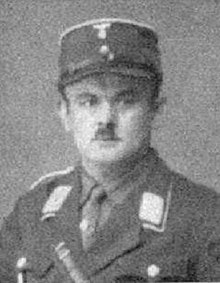Paul Schmidt (politician, 1901)
Paul Schmidt (born September 19, 1901 in Albrechtsdorf near Breslau ; † April 17, 1977 in Heubach-Lautern ) was a German NSDAP functionary.
Live and act
Schmidt attended elementary school in Stein in the Nimptsch district in Silesia. He then made his living as a farm laborer. From July 1918 to January 1919 Schmidt was with the volunteer Red Cross. From January 1919 to mid-1921, Schmidt worked for the border guard . Then he worked as a miner. Since 1931 Schmidt had been a member of the works council of the mine in which he was employed.
On June 6, 1926, Schmidt joined the NSDAP and the Sturmabteilung (SA).
In the general election of July 1932, Schmidt was a candidate of his party for the constituency 17 (Westphalia North) in the Reichstag voted, of which he was subsequently without interruption until the end of Nazi rule in May 1945th The most important parliamentary event in which Schmidt took part during his time as a member of parliament was the passing of the Enabling Act in March 1933. This law, which formed the basis for the establishment of the National Socialist dictatorship, was passed with Schmidt's vote, among others.
On October 4, 1933, Schmidt was commissioned as Obersturmbannführer with the management of SA Standard 15. Before that he was the leader of SA Standard 137 "Ludwig Knickmann" in Gelsenkirchen . On May 1, 1936, Schmidt was appointed leader of SA Standard 22 in Ahlen . On January 1, 1938, Schmidt was made available as SA leader.
literature
- Erich Stockhorst: 5000 people. Who was what in the 3rd Reich . Arndt, Kiel 2000, ISBN 3-88741-116-1 (unchanged reprint of the first edition from 1967).
Web links
- Paul Schmidt in the database of members of the Reichstag
| personal data | |
|---|---|
| SURNAME | Schmidt, Paul |
| BRIEF DESCRIPTION | German politician (NSDAP), MdR |
| DATE OF BIRTH | September 19, 1901 |
| PLACE OF BIRTH | Albrechtsdorf near Breslau |
| DATE OF DEATH | April 17, 1977 |
| Place of death | Heubach-Lautern |
